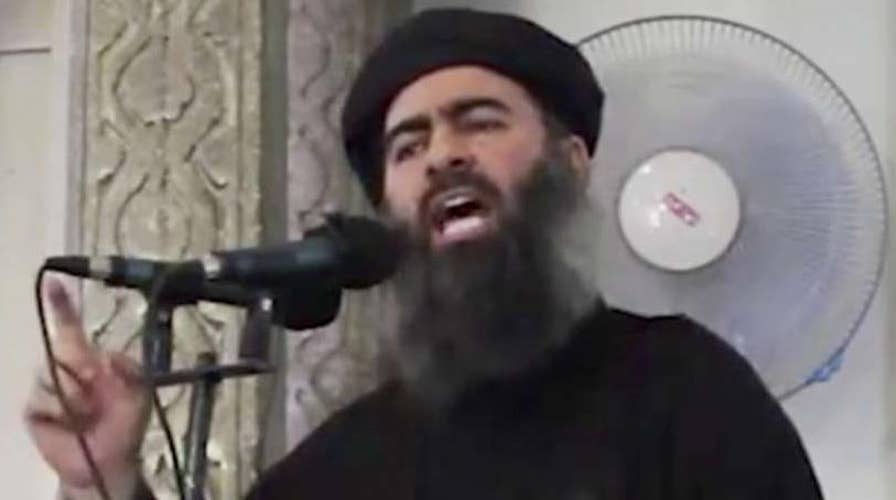Renewed push to track down and take out Abu Bakr al-Baghdadi
Obama administration steps up focus on ISIS leader
The U.S. military would take advantage of any opportunity to kill Islamic State leader Abu Bakr al-Baghdadi, a spokesman based in Baghdad told reporters Wednesday, adding that he could not confirm recent reports that a coalition airstrike killed the terrorist in Syria.
"We don't know for sure" that it happened, Col. Christopher Garver said during a news briefing. Garver added that there were no U.S. airstrikes in Raqqa on June 10, despite multiple reports claiming the strike unfolded there. One of the reports came from ISIS-linked news agency al-Amaq.
Garver said there were "two small strikes" the next day in Raqqa, however. "We've been targeting senior leaders of [ISIS] and if we've got an opportunity to get him, we would take it."
There is currently a $25 million bounty on al-Baghdadi's head.
Meanwhile, Iraqi forces were having a tough time pushing into the heart of the largest concentration of ISIS fighters in western Iraq near Baghdad, Garver told reporters. He said Iraqi forces were inside the "southern edge" of Fallujah, located 45 miles west of the Iraqi capital.
"The fighting remains intense inside the city," he added. Garver said while Iraqi forces were inside Fallujah, they had not yet reached the center of the city.
In the past week, U.S. jets have conducted 19 airstrikes in and around Fallujah, he said. "We have hit tactical units and fighters, heavy machine guns, rocket-propelled grenade teams, mortar systems, recoil-less rifles, air artillery pieces, and Daesh vehicles," Garver added, using another name for ISIS.
Garver said 40,000 Iraqi civilians have evacuated Fallujah.
When asked by Fox News about Iranian-backed Shia militias carrying out reprisal killings against Sunni Iraqi citizens escaping Fallujah, Garver could not confirm the reports. "We have not seen that specifically," he said.
But he acknowledged such killings between Iranian-backed forces, some of whom killed American troops in the past decade in Iraq, have occurred recently in the ISIS fight around Tikrit. "Clearly, it is a problem, something we're going to watch carefully."
Photos of Iran's Quds Force commander Qassem Soleimani and his deputy Abu Mahdi al Muhandis have surfaced on social media showing how the Iranian generals charged leading Shia militias in the Fallujah battle. Iraq's prime minister said last week Soleimani was serving in Iraq as an invited guest of his government.
Garver said the Iraqi government had approved the U.S. Army Apache strike earlier this week against an ISIS car bomb 50 miles south of Mosul before it took place. He told reporters the Apaches were located at various locations inside Iraq, but would not give a specific location when asked if they had been moved to support the Mosul operation.
Garver said there have been 50 airstrikes in northern Iraq in the past week.
In Syria, the U.S.-led coalition has conducted 73 strikes in the last week supporting an operation to liberate the ISIS-held town of Manbij, seen as a key logistics hub for ISIS to ferry troops and supplies across the Turkish border.









































